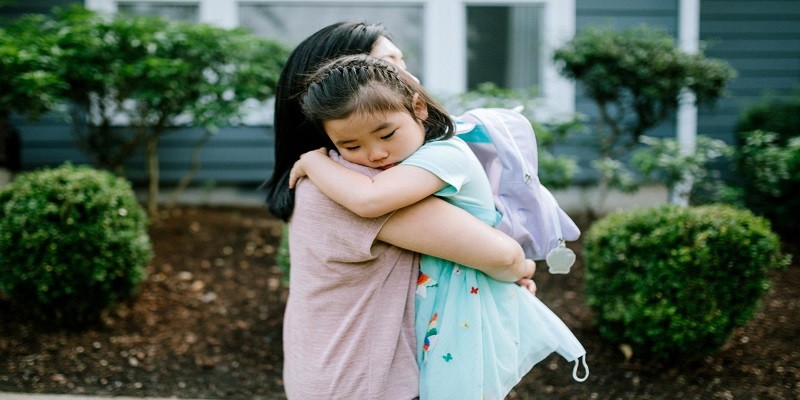Last Updated on January 15, 2025
To cope with not seeing your child every day, seek support from a therapist or support group. This will help you acknowledge and accept your feelings, and provide guidance on how to navigate this difficult situation.
Additionally, make the most of the time you do have with your child by engaging in quality activities and open communication. Showing love and maintaining contact through texts and phone calls can also help ease the separation. It’s important to remember that separation can have psychological effects on both parents and children, so practicing self-care and being patient with the process is key.
Accept And Acknowledge Your Feelings
Separation from your child can be a challenging experience that can bring up a range of emotions. Understanding and accepting your feelings is a crucial first step in coping with not seeing your child every day. By acknowledging and validating your emotions, you can begin to navigate this new reality and find healthy ways to cope. In this section, we will explore the emotional impact of not seeing your child daily, recognize your own sadness and grief, and validate your feelings throughout this process.
The Emotional Impact
Not seeing your child every day can have a profound emotional impact on both parents. It is normal to feel a sense of loss, sadness, and even grief when you are separated from your child. This separation can trigger a wide range of emotions such as guilt, loneliness, anger, and longing. It is important to understand that these emotions are a natural response to the situation and that it is okay to experience them.
Of course, every individual’s emotional journey is unique, and you may also experience other emotions that are specific to your circumstances. Taking the time to recognize and acknowledge these emotions can help you better navigate through this challenging time.
Recognizing Your Own Sadness And Grief
Sadness and grief are common emotions that arise when you are not able to see your child every day. Recognizing and acknowledging these feelings is a vital step in coping with this situation. Allow yourself to grieve the loss of the routine and the physical presence of your child. It is normal to miss their smile, laughter, and comforting presence.
You may also find that your sadness and grief come in waves, and that is okay too. Some days might be harder than others, and that is a natural part of the healing process. Give yourself permission to feel these emotions and be patient with yourself as you navigate through them.
Validating Your Feelings
It is important to validate your feelings throughout this process. Validating your emotions means acknowledging that they are real and understandable. Each feeling you experience is valid and deserves to be acknowledged without judgment.
One way to validate your feelings is by finding a supportive community or seeking professional help if needed. Sharing your story with friends, family, or support groups can provide a safe space for you to express your emotions and receive validation from others who may have experienced similar situations.
Additionally, practicing self-compassion is crucial. Don’t be too hard on yourself for feeling a certain way. Remember that it is natural to experience a range of emotions while adjusting to not seeing your child every day.
By accepting and acknowledging your feelings, you are taking an important step towards coping with not seeing your child daily. Understanding the emotional impact, recognizing your own sadness and grief, and validating your feelings will help you find healthy ways to cope and navigate through this challenging time.
Maintain Open Communication
When you are not able to see your child every day, maintaining open communication becomes crucial. It allows you to stay connected, express your love and support, and ensure your child feels valued and cared for. There are several ways through which you can maintain open communication, and establishing a consistent communication routine, utilizing technology for virtual connections, and encouraging honest dialogue with your child are some effective strategies.
Establishing A Consistent Communication Routine
Establishing a consistent communication routine is essential for both you and your child. It provides a predictable structure and helps create a sense of stability. Discuss with your child’s other parent or caregiver to establish a schedule that works for everyone involved. This routine can include daily phone calls, video chats, or even weekly visits, depending on the circumstances. Consistency will give your child something to look forward to and helps maintain a strong parent-child bond.
Utilizing Technology For Virtual Connections
The advancement in technology has made it easier than ever to stay connected with your child, even if you are physically apart. Take advantage of various digital platforms such as video calls, instant messaging, and social media to bridge the physical distance. Plan virtual activities together, like reading a bedtime story or watching a movie, to create shared experiences. Sending emails or voice messages can also be a meaningful way to maintain regular communication and remind your child of your love and presence.
Encouraging Honest Dialogue With Your Child
It is important to encourage open and honest dialogue with your child, allowing them to express their feelings, concerns, and aspirations. Create a safe and non-judgmental space where your child feels comfortable sharing their experiences and thoughts. Ask open-ended questions to initiate meaningful conversations and actively listen to their responses. Foster trust and mutual understanding by respecting their perspectives, validating their emotions, and affirming your support. Honest dialogue can help strengthen your relationship and ensure that your child feels heard and understood.
Remember, while not seeing your child every day can be challenging, maintaining open communication is key to coping with the situation effectively. By establishing a consistent communication routine, utilizing technology for virtual connections, and encouraging honest dialogue, you can continue to foster a loving and supportive relationship with your child, even when you are physically apart.
Utilize Quality Time Together
Not being able to see your child every day can be a challenging situation for any parent. However, it’s essential to make the most of the time you do spend together to ensure a strong and meaningful bond. By utilizing quality time together, you can create lasting memories and prioritize the quality of your interactions over quantity. Here are some ways to make the most of the time spent with your child:
Making The Most Of The Time Spent With Your Child
When you have limited time with your child, it’s crucial to make every moment count. By planning activities and experiences that both of you enjoy, you can create memories that will last a lifetime. Here are some suggestions to make the most of your time:
- Engage in activities that interest both you and your child, such as going for a hike, visiting a museum, or playing a favorite sport.
- Set aside designated quality time, free from distractions like phones or work, to fully focus on your child.
- Communicate openly and actively listen to your child to strengthen your bond and deepen your understanding of their thoughts and emotions.
- Encourage open-ended conversations that allow your child to express themselves freely and share their experiences.
- Create traditions and rituals that you can enjoy together, such as weekly movie nights or Sunday morning pancake breakfasts.
Engaging In Activities That Create Lasting Memories
One of the best ways to cope with not seeing your child every day is to engage in activities that create lasting memories. These experiences not only strengthen your bond but also provide your child with a sense of stability and love. Here are some activities that can create lasting memories:
- Plan a special day trip to a new place or a favorite destination. Explore new surroundings together and enjoy discovering new things.
- Engage in hobbies or interests that your child enjoys, such as painting, cooking, or gardening. This not only allows you to spend quality time together but also encourages the development of their skills and passions.
- Document your time together with photographs, scrapbooks, or a journal. These tangible mementos not only serve as reminders of the memories shared but can also be cherished for years to come.
- Consider involving your child in activities that promote learning and personal growth, such as music classes, sports teams, or community service projects. These experiences can help them develop new skills and broaden their horizons.
Prioritizing The Quality Of Interactions Over Quantity
It’s important to remember that the quality of your interactions with your child is more important than the quantity of time spent together. By prioritizing the quality of your interactions, you can make the most of the limited time you have and create a strong and meaningful connection. Here are some ways to prioritize quality:
- Be fully present when you are with your child, giving them your undivided attention and showing genuine interest in their lives.
- Focus on creating positive and loving experiences that foster a sense of security and happiness.
- Create a consistent and reliable routine for your time together, ensuring that your child can rely on this time as a source of stability and comfort.
- Engage in meaningful conversations that go beyond surface-level interactions. Ask open-ended questions and truly listen to their answers.
Remember, although not seeing your child every day can be difficult, by utilizing quality time together, engaging in activities that create lasting memories, and prioritizing the quality of your interactions, you can foster a strong and meaningful connection that transcends physical proximity. Every moment you spend together is an opportunity to create a lasting bond and make a positive impact on your child’s life.
Frequently Asked Questions On How To Cope With Not Seeing Your Child Every Day?
What Are The Psychological Effects Of Being Separated From Your Child?
The psychological effects of being separated from your child include increased risks of depression, difficulty with social functioning, attachment issues, and PTSD. Both parents and children may experience trauma and emotional distress due to the separation. It’s important to seek help from therapists or support groups to cope with these effects.
How Do You Cope When You Miss Your Child?
To cope when you miss your child, take positive action by spending quality time together and staying in contact through calls or texts. Accept and acknowledge your feelings, seeking support from friends, therapists, or support groups. Introduce new people and places slowly to help both you and your child adjust to time apart.
Avoidance of separation issues can lead to depression and other psychological effects. Practice being apart and gradually introduce new caregivers.
How Do I Cope With Time Away From My Child?
To cope with time away from your child, acknowledge your feelings and accept them. Seek support from a therapist or support group. Have quality time together when you can, and stay in contact through texts and calls. Introduce new people and places slowly to ease separation anxiety.
Remember, it’s important to take positive action and practice being apart to adjust to the situation.
How Do You Deal With Separation When A Child Is Involved?
To deal with separation when a child is involved, it’s important to take positive action. Seek help from a therapist or support group to cope with the emotional stress. Acknowledge and accept your feelings, and make sure to spend quality time with your child when you do see them.
Avoid dwelling on the separation and focus on creating new experiences together.
How Can I Cope With Not Seeing My Child Every Day?
It is important to acknowledge and accept your feelings as a first step in coping with not seeing your child every day. Allow yourself time to grieve and seek support from friends, family, or a therapist if needed.
What Are Some Ways To Manage Emotional Stress When Not Seeing My Child Every Day?
Practice self-care activities such as exercising, journaling, or engaging in hobbies that bring you joy. Surround yourself with a reliable support system and consider seeking professional help if the emotional stress becomes overwhelming.
Conclusion
Coping with not seeing your child every day can be challenging, but there are ways to manage the emotional stress. Acknowledging and accepting your feelings is an important first step in adapting to the new situation. Seek support from a therapist or support group to help you navigate through this difficult time.
Additionally, make the most of the quality time you have with your child, engaging in activities and open communication to stay connected. Remember, with patience and love, you can find ways to cope and maintain a strong bond with your child.







